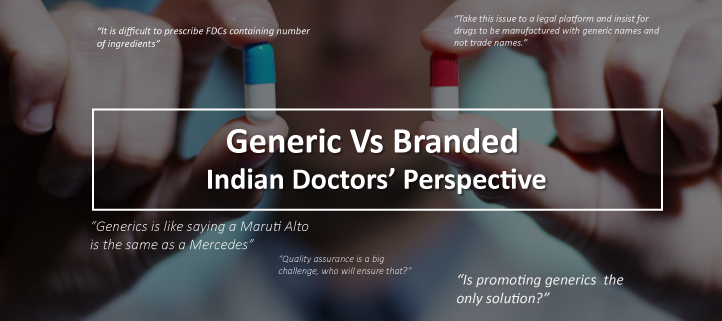
The recent MCI directive that mandates prescription of generics has stirred up a hornet’s nest leading to widespread debates and discussions over its impact. While supporters harp on about its long-term benefits to the common man, naysayers claim it to be a futile effort, just another piece of paper without teeth.
Irrespective of whether the ruling achieves the intended, it bears a huge impact on the way two key healthcare entities – physicians and pharma, operate. Physicians will now have to learn news ways of writing prescriptions and pharma will have to lend the required support. Keeping this in mind, Docplexus surveyed 1,082 doctors to understand their views on the new regimen and expectations from pharma companies.
Here are the insights:

Takeaways for Pharma
The survey results indicate that doctors have several concerns with generic prescriptions. Pharma companies too are anxious about the new ruling and foresee tumultuous days ahead. To ride out this storm, pharma needs new ways of engaging with its audience. It should focus on addressing the concerns and problems of its customers. Following are some ways pharma can continue to stay relevant:
• Make a convincing case for your company’s generics – Only 17% doctors favor the new directive. An alarming 74% feel that prescribing generics will worsen patient outcomes. A significant number fear that the quality of medical care would be compromised. Most large Indian pharma companies outsource 90% of their production to small manufacturing units under ‘loan license’. This raises concerns over their quality. Lack of a central regulatory authority to define standard manufacturing processes and quality levels further perpetuate the problem. These factors have rendered doctors highly skeptical about the bioavailability and overall efficacy of generics.
It is essential for pharma to convey doctors their adherence to GMPs (Good Manufacturing Practices). A new communication strategy that stresses their commitment towards maintaining the highest quality will alleviate doctors’ fears about poor quality. The focus should now change from marketing ‘branded products’ to marketing the ‘company’ as a brand that stands for quality. So the next time a doctor writes a generic prescription, he/she adds your company’s product in brackets.
• Cater to doctors’ new information needs – The new directive puts physicians under tremendous pressure. They now have to unlearn existing prescription practices and acquaint themselves with molecule names. Pharma should extend the much-needed support to the medical community. 36% of physicians seek pharma’s help in understanding molecules/formulations. It is extremely important that the field force is trained well to cater to the new expectations. Pharma could design new CME courses and revise medical conference itineraries to include academic support with respect to the new scenario. Webinars are an excellent mode of educating a large number of doctors in a short period of time. It is essential to note that a majority of doctors plan to write brand names (in brackets) while writing a generic prescription. This signals that pharma’s communication strategy should focus on establishing an association between the chemical name and the brand name.
• Make it easier for physicians to prescribe combination drugs – 45% of all drugs prescribed in India are a combination of different molecules. Most doctors surveyed are worried about making errors in prescribing combination drugs, especially with more than two molecules. They also think writing such prescriptions is a time-consuming affair. Pharma could supply printed forms listing commonly prescribed combinations of molecules for doctors to choose from.
• Strengthen patient engagement – The ruling has made it necessary for pharma to attend to patients as they will now play a big role in deciding which generic to purchase. Moreover, a majority of Indian patients are ill-equipped to make an informed decision in this matter. Also, doctors worry that retailers will dupe ignorant patients into buying spurious medicines, causing more harm than good. This presents an opportunity to pharma which can take the lead in educating patients. A wise move would be to focus on helping patients maintain overall wellness. This will drive engagement and ensure mindshare.
• Forge new bonds – The ruling has given rise to a new audience segment for pharma – the chemists. There are over 8 lac chemists in India. Pharma will have to devise strategies to tap this new set of customers who will now bear significant influence on which drugs get sold.
Pharma companies perceive the government’s latest move as a harbinger of uncertainty. A new strategy that supports prescribers and connects with other audience groups will help them convert these challenging times into lucrative opportunities.
